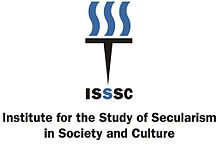Barry Kosmin
 |
|
| Abbreviation | ISSSC |
|---|---|
| Formation | 2005 |
| Type | Research Institute |
| Purpose | The Institute for the Study of Secularism in Society and Culture (ISSSC) was established to advance understanding of the role of secular values and the process of secularization in contemporary society and culture. Nonpartisan and multidisciplinary, the Institute conducts academic research, sponsors curriculum development, and presents public events. |
| Headquarters | Trinity College, Hartford, CT USA |
|
Official language
|
primarily English |
|
Key people
|
Barry A. Kosmin Director Ariela Keysar Assoc. Director Juhem Navarro-Rivera Research Fellow |
| Affiliations | Trinity College, Hartford, CT USA |
| Website | ISSSC[1] |
The Institute for the Study of Secularism in Society and Culture (ISSSC) is located at Trinity College in Hartford, Connecticut. ISSSC was established in 2005 to advance the understanding of the role of secular values and the process of secularization in contemporary society and culture. Designed to be multidisciplinary and nonpartisan, the Institute conducts research, lectures and public events.
Author and professor Barry Kosmin, PhD created the ISSSC and remains the director of the Institute.
Author of over 20 books, Kosmin is a research professor of public policy and law at Trinity College. In October 2011 Kosmin accepted a seat on the Board of Directors of Center for Inquiry (CFI), where, his responsibilities include the Council for Secular Humanism and the Committee for Skeptical Inquiry as well as serving on the CFI affiliate committee.
He is the joint editor of the new academic journal Secularism & Nonreligion and was one of the principal investigators of the 2008 American Religious Identification Survey (ARIS). Kosmin is considered the leading expert "on the growing percentage of Americas who lack a religious identity, the so called "nones". Kosmin has been featured on podcasts such as Center for Inquiry's Point of Inquiry and published in Free Inquiry magazine discussing the results of the ARIS.
Previously named the National Survey of Religious Identification in 1990, it was renamed the American Religious Identification Survey (ARIS) in 2001. The survey was originally created as a social experiment to record the response to the "What is your religion?" question. They found it was necessary to ask a series of questions such as "Do you want to have a religious funeral?" in order to get a better grasp of the answer to the main question.
...
Wikipedia
